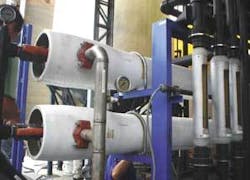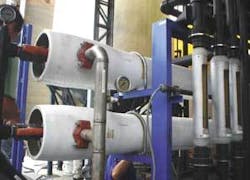Hollow fiber and spiral membranes recycle biologically treated effluent
Efluentes Industria è Comercio de Equipamentos Ltda. of São Paulo, Brazil is quickly expanding its applications of membrane technology in designing and constructing facilities that treat wastewater with high concentrations of oil and heavy metals.
MWM International, a diesel engine manufacturer located in São Paulo, Brazil, recently installed a second ultrafiltration (UF) system with Targa® HF cartridges and TFC® -XR RO spiral membranes from Koch Membrane Systems, Inc. (KMS) that recycles 50 percent of the total wastewater that leaves the facility and reduces municipal water charges.
This second installation resulted from the enormous success of a prior installation of KMS technology in the late 1990s. The additional system serves as a complementary solution to MWM’s activated sludge system and recycles biologically treated effluent for reuse within the plant. KMS is based in Wilmington, Massachusetts, USA.
MWM’s technical team, in cooperation with Efluentes Industria è Comercio de Equipamentos Ltda. and KMS, conducted a cost analysis to find out how much the new system would save them. The customer’s inlet municipal water costs are US$ 13.5 per 1,000 US gallons. With the recycling system, 50% less municipal water will be used. Since daily consumption has dropped to only 27,000 gallons, the savings amounts to $10,935 per month, providing a return on investment that will enable the customer to repay the total cost of the new UF system and membranes in less than three years.
In the late 1990s, prior to this second installation, Efluentes, a São Paulo-based company that designs and engineers wastewater treatment facilities, installed UF system with FEG tubular membranes from KMS in the MWM facility following a successful pilot test of the system. MWM was convinced in only two weeks that the membrane system could cost effectively treat the wastewater with contaminant removal efficiency of more than 99 percent, while also adhering to company environmental policy.
Since 1980, Efluentes, a family-run business, founded by João Roberto Nunes Sr., has installed more than 500 wastewater treatment plants in Brazil and is quickly expanding its presence throughout South America with additional facilities in Uruguay and Chile. Although Efluentes is an expert in using biological and chemical processes to treat industrial wastewater, sanitary wastewater and combined effluent, it has recently turned to membrane technology as a cost effective and environmentally friendly alternative.
The first UF system installed at MWM was better for the environment than its chemical-based treatment system because it did not generate sludge and no chemicals were needed to separate soluble oils. The automated system significantly lowered operational costs and reduced labor expenses.
Eliminating sludge generation also eliminated the high cost of its disposal. The membrane system produced a small volume of concentrated waste that remained inside the UF process tank. After two weeks of continuous operation, the process tank was drained and the reject was sent to a waste disposal company.
MWM installed 96 FEG membranes from KMS, and shortly thereafter experienced a 70 percent reduction in operational costs. The company was particularly happy with these results, since previous estimates had suggested that the installation of a UF system for an oily wastewater application would result in cost savings of no more than 50 percent.
For more than six years, the membrane system has been successfully treating oily wastewater using the original FEG membranes. FEG tubular membranes typically last up to 10 years.
MWM installed the aforementioned second UF system from KMS to further reduce municipal water usage and increase water recycling. The additional system complements MWM’s activated sludge system and recycles 50 percent of the biologically treated effluent for reuse within the plant.
To help meet MWM’s goal, Efluentes installed a UF system with six, 8-inch TARGA hollow fiber cartridges and eight, 8-inch TFC-XR RO spiral membranes, both of which were designed and manufactured by KMS. This system enabled MWM to recycle four m3/h (17.6 gpm) of RO permeate for reuse in cooling towers, engine washers, and other applications.
The TARGA UF cartridges were selected because they remove particulates, colloids and larger molecular weight components, and are particularly effective as pretreatment for spiral RO membranes. Spiral membranes provide a cost effective solution for applications with low suspended solids concentrations and minimal available space. The TFC-XR spiral membranes are designed specifically to recover pure water from brackish water or waste streams with high salinity. They are also extremely robust in that they can withstand pressures in excess of 1,000 psi.
Since MWM installed the two membrane systems, operational costs have decreased significantly and the company is complying with its environmental policy.
Author’s Note
Imran Jaferey is the business manager for industrial water and wastewater at Koch Membrane Systems, Inc.

